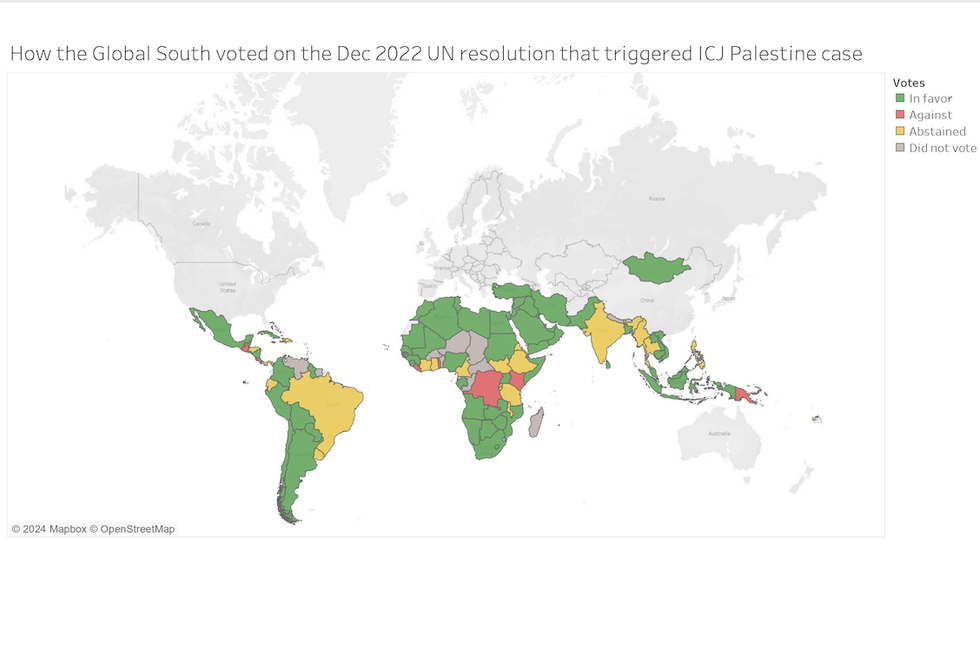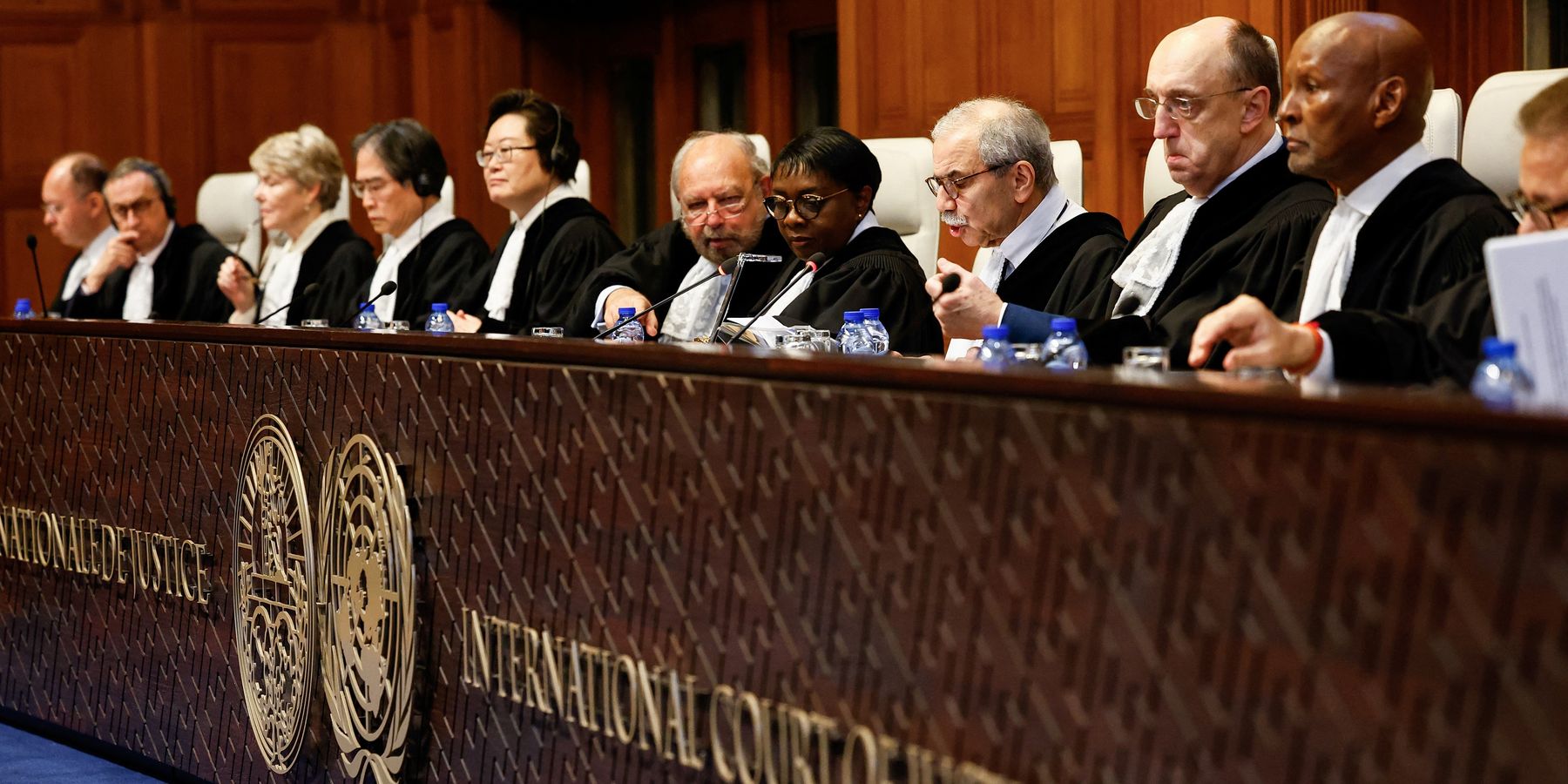The gulf between the United States and the rest of the world — in particular the Global South — on the Israel-Palestine conflict remains sharp and wide.
This was demonstrated yet again at The Hague last week, where the International Court of Justice (ICJ) is hearing a case triggered by a U.N. General Assembly (UNGA) resolution in December 2022 seeking an advisory opinion on the “legal consequences” of the Israeli occupation of Palestine.
The case has taken on even greater significance in the current context of Israel’s military action in Gaza and the West Bank. The Israeli assault (in response to Hamas’s October 7 attack) has led to around 30,000 Palestinian deaths and widespread destruction of homes, mosques, churches, hospitals, and community centers with seemingly no end in sight. A BBC investigation at the end of January found that between 50% and 61% of the Gaza Strip’s buildings had been destroyed or damaged in the war, while over 80% of the population had been displaced.
This case also comes on the heels of last month’s ICJ hearing in a separate case brought by South Africa alleging serious violations of the 1948 Genocide Convention by Israel in its current assault on Gaza. In that case, the ICJ issued a provisional order that Israel’s actions in the current war against the Palestinians could plausibly be considered genocide. Other Global South states have initiated measures at the International Criminal Court. Overall, states representing close to 60% of the Global South’s population have either directly or indirectly backed international legal action on Palestine, as our previous analysis showed.
Last week’s proceedings were the early stage of the UNGA-triggered case, in which the oral arguments focused on whether the court has jurisdiction over the matter. Of the 49 countries and three international organizations (the League of Arab States, the Organization of Islamic Cooperation, and the African Union) that argued before the court’s judges — the most of any case in the ICJ’s history — only four argued that the court lacked jurisdiction and should therefore not render an opinion: the United States, the United Kingdom, Hungary, and Fiji.

Although this round of argumentation centered around the question of the court’s jurisdiction, the representatives who spoke on behalf of their respective countries presented their view of Israel’s occupation as well as current and past military activity in Palestine. Cuba went as far as to explicitly argue that Israel’s military aggression in the current war amounts to a “genocide.” Several others, including Bolivia and Chile, argued that the occupation violates international law, and should therefore end.
The extent to which this issue resonates across the Global South is evident in the fact that Indonesia, the world’s fourth-most populous country and a U.S. partner, so strongly supports the Palestinian cause that the country’s foreign minister, Retno Marsudi, left the G20 Foreign Ministers’ Meeting in Brazil to personally present Indonesia’s argument before the court. She argued that Israel’s “unlawful occupation and its atrocities must stop and should not be normalized or recognized.” Indonesia sees Palestine as the last unresolved issue of decolonization, which it is mandated to oppose according to its constitution.
Bangladesh spoke of violations of three basic tenets of international law: the right to self-determination; the prohibition to acquire territory by force; and the prohibition of racial discrimination and apartheid. Namibia also cited apartheid in its arguments, while The Maldives spoke of appropriation of water resources for Palestine, among other things. The African Union, collectively representing 54 African states, described “an asymmetrical situation in which an oppressed people is confronted with an occupying power.”
Other Global South states arguing in favor of the ICJ’s jurisdiction in this case even called out the United States by name. Guyana, for example, said that the U.S.’s argument fails because the U.S. wrongly claims that there is an ongoing peace negotiation between Israel and Palestine, therefore leaving no legal authority for the ICJ to deliver an opinion on this issue.
Algeria also explicitly said that this case not only stains Israel’s image, but also hurts that of the United States, as the U.S. government continues to support Israel despite its continued violation of international law.
Fiji was the only Global South state in the hearings to broadly align with Israel and the United States in its arguments. It argued that a two-state solution could only come about when (Palestinian) terrorism ended. It also stated that Israel had not agreed to the case, the ICJ approach circumvents the Oslo process, and the information available to the court was one-sided. Additionally, Zambia struck a cautious tone, supporting a two-state solution but also saying that a solution should not “squarely blame one party.”
The deep opposition to U.S. and Israeli positions was not just confined to the Global South. Most core U.S. allies in the Global North were also opposed. For example, France argued that Israel’s settlements in Palestine are illegal. France also asked the court to render an opinion on the extent to which the Palestinians have suffered damages, and asked that the court consider how much restitution or compensation is appropriate for the damages suffered by Palestinians under Israeli occupation.
Even the United Kingdom — the lone core U.S. ally aligned with American and Israeli positions in the case — called out Israel’s occupation. The country’s representative stated that although the UK opposes ICJ jurisdiction in this case, in part because the scope of a fact-finding mission would be too broad in the context of an ongoing conflict, Israel’s continued and expanding occupation of Palestine is illegal under international law.
China and Russia, the two great power rivals of the United States, both supported the majority opinion, arguing in favor of the ICJ’s jurisdiction in the case and against Israel’s occupation of Palestine.
This comes as growing security, economic, and political ties are being formed by the Chinese and Russians with states across the Global South. The Russian mercenary group known as the Wagner Group — recently rebranded as Africa Corps — has tapped into strong anti-Western sentiment to form military and security ties with states across central and west Africa, largely replacing unpopular and outdated U.S. and French security projects in the area.
Meanwhile, China continues to promote its Belt and Road Initiative globally, connecting with countries across the world, claiming to meet their economic demands and support development projects. China and Russia’s positions against the Israeli occupation of Palestine have only hardened in recent months.
Both China and Russia are also leading members of BRICS, in which they are in a de facto coalition with leading middle powers of the Global South looking to plug existing and major gaps in the current international system as well as prominently project their voice on the global stage.
Washington’s isolation on Palestine may not have mattered much if we were still in a unipolar world. But with relative power slowly diffusing away from Washington, the United States may benefit from shifting its policies and bridging its position with the rest of the world on the highly emotive issue of Palestine that is causing enormous human suffering and already beginning to destabilize the wider region.
- ICJ lands stunning blow on Israel over Gaza genocide charge ›
- Mapping it: Global South states charging war crimes in Gaza war ›
- Bibi's push for a long war undermines Israel’s best friend — America | Responsible Statecraft ›
- That stinks: Global opinion of US goes down the toilet | Responsible Statecraft ›
- 42 years ago today: The Sabra & Shatila massacre | Responsible Statecraft ›
- Why the Israeli-Palestinian conflict has endured | Responsible Statecraft ›
- The UK hits peak feebleness on Israel–Gaza | Responsible Statecraft ›
















